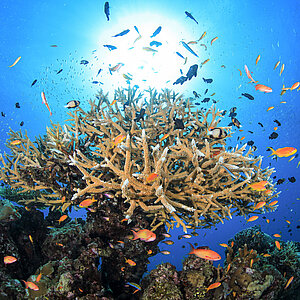Climate, Coastal and Marine Biodiversity in Thailand (CCMB Thailand)
Thailand is the second largest CO2 emitter in Southeast Asia and ranks 13th globally in terms of its vulnerability to the impacts of climate change. Ambitious targets in key sectors continue to be hampered by capacity and data deficits. Frameworks for action need to be further strengthened and synergies between climate and biodiversity harnessed. Therefore, the project supports Thailand in developing policy guidelines, tools, and M&E for climate and biodiversity action. Mainstreaming of climate and biodiversity objectives will be promoted in the marine, coastal resources and sustainable tourism sectors. In collaboration with government representatives and relevant stakeholders, the project provides policy advice and supports capacity development and inter-ministerial exchange. The project also promotes regional and international dialogues and acts as an interface between the IKI and the Thai government.
- Countries
- Thailand
- IKI funding
- 10,000,000.00 €
- Duration
- 06/2022 till 05/2027
- Status
- open
- Implementing organisation
- Deutsche Gesellschaft für Internationale Zusammenarbeit (GIZ) GmbH
- Political Partner
-
- Department of Climate Change and Environment (DCCE)
- Ministry of Natural Resources and Environment (MoNRE) - Thailand
- Office of Natural Resources and Environmental Policy and Planning - ONEP - Thailand
- Implementing Partner
-
- Office of Natural Resources and Environmental Policy and Planning - ONEP - Thailand
State of implementation/results
- 2035NDC - Thailand conducted a public hearing of its draft 2035NDC in March 2025. Following this, the draft NDC was discussed in a working group meeting (composed of representatives of all relevant sectors) and the National Climate Change Committee which includes sectoral representatives as well as representatives from the Ministry of Finance and the Bureau of Budget. Thailand conducted another public hearing of its draft 2035NDC again in August 2025, and now it is in the pipeline for cabinet approval. In its draft 2035NDC, Thailand moves from a business-as-usual (BAU) emission reduction target to an absolute emission reduction target of -47% (135.2 MtCO2eq) relative to 2019 level, with economy-wide coverage including energy, transport, IPPU, agriculture, waste and LULUCF. By 2035, Thailand plans to achieve a carbon absorption capacity of 118 MtCO2eq in the LULUCF sector (increase from 92 MtCO2eq in 2019).
- Thailand Taxonomy II launch - On 27 May 2025, Thailand Taxonomy Phase II was officially launched and provides guidelines for low-carbon investments in the agriculture, construction and real estate, manufacturing, and waste management sectors. The thresholds for activities developed are based on the 1.5° C pathway – meaning that all sectors must move to net-zero by 2050. These four sectors are added in addition to the energy and transport sector which were published in 2023. (More info: www.thai-german-cooperation.info/…)
- BIODAY2025 – On 31 May 2025, the Office of Natural Resources and Environmental Policy and Planning (ONEP) hosted the Biodiversity Day 2025 event, aiming to increase public awareness on biodiversity protection. GIZ Thailand joined forces with various Thai government agencies, private companies and international organizations to share knowledge and highlight the climate-biodiversity synergy in marine and coastal management.
- Nature-based Solutions (NbS) – On 6 August 2025, the Office of Natural Resources and Environmental Policy and Planning (ONEP) in cooperation with GIZ Thailand hosted the first in a series of workshops on Nature-based Solutions (NbS). This first workshop focused on addressing inter-agency cooperation challenges on NbS implementation in Thailand and was attended by over 60 government representatives. The workshop is also supported by IUCN. The participants emphasized needs for standardized M&E (Monitoring and Evaluation) system and accurate baseline data, as well as alignment of climate and biodiversity strategies.
- Thailand Green Tourism Plan 2030 – On 6 Aug 2025, GIZ Thailand joined forces to drive the “Thailand Green Tourism Plan 2030”, an initiative spearheaded by the Thai Department of Tourism in collaboration with various Thai government agencies, private sector, community and international organizations. The CCMB project supports the collaboration between the Thai Ministry of Tourism and Sports and the Department of Climate Change and Environment on climate risk assessment to Thailand’s tourism value chain, development of adaptation and mitigation options to be integrated into Thailand Green Tourism Plan 2030, as well as recommendation of instruments, such as green tourism standards and tourism calendars, to support green tourism management that integrate climate and biodiversity aspects in synergy.
Latest Update:
12/2025
Project relations
Legend:
The link has been copied to the clipboard





